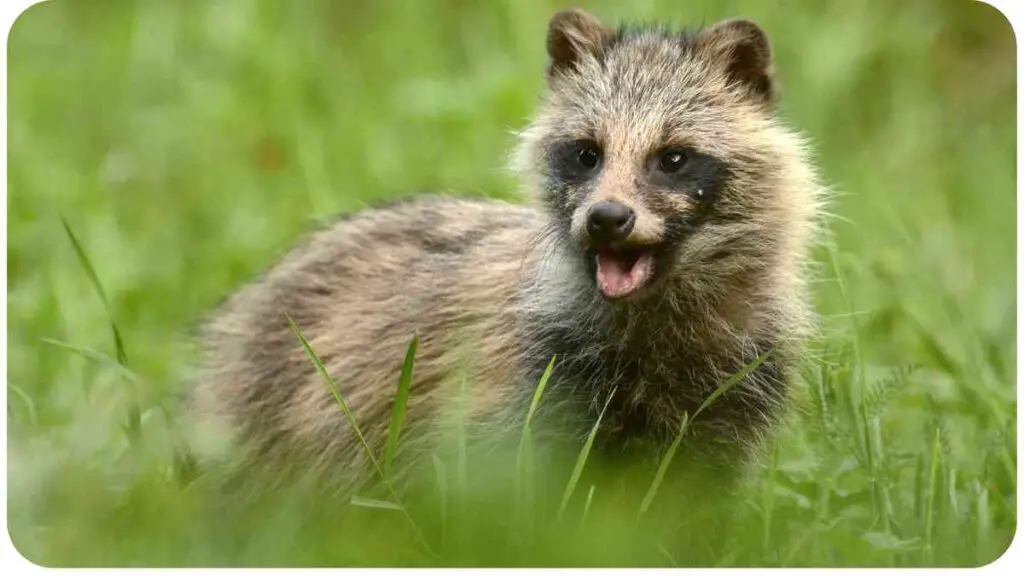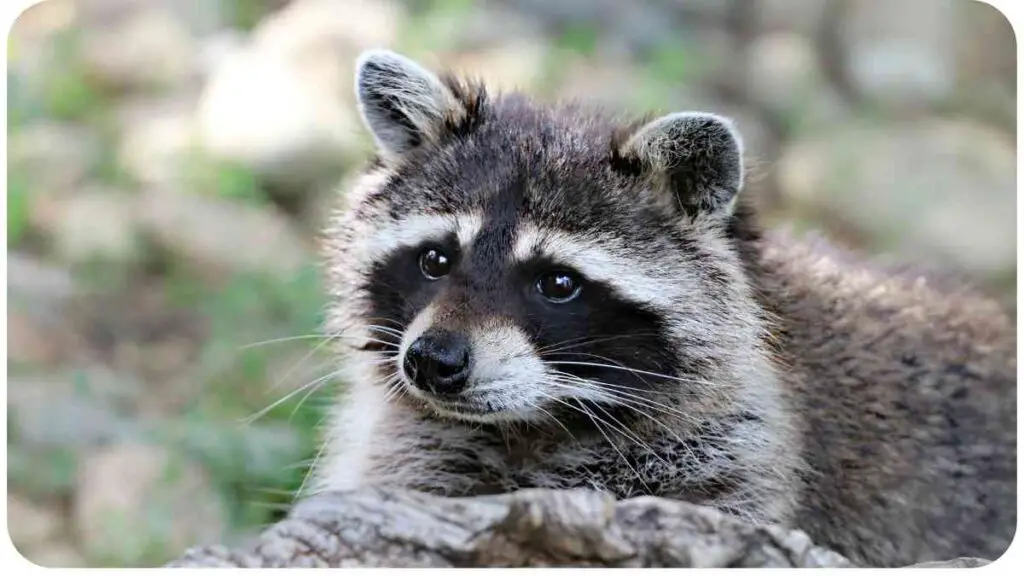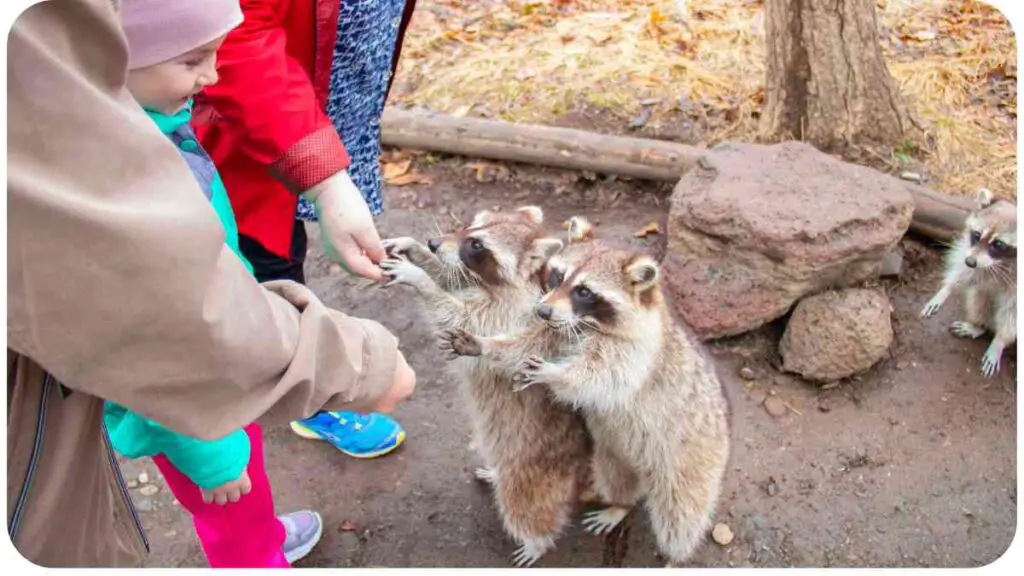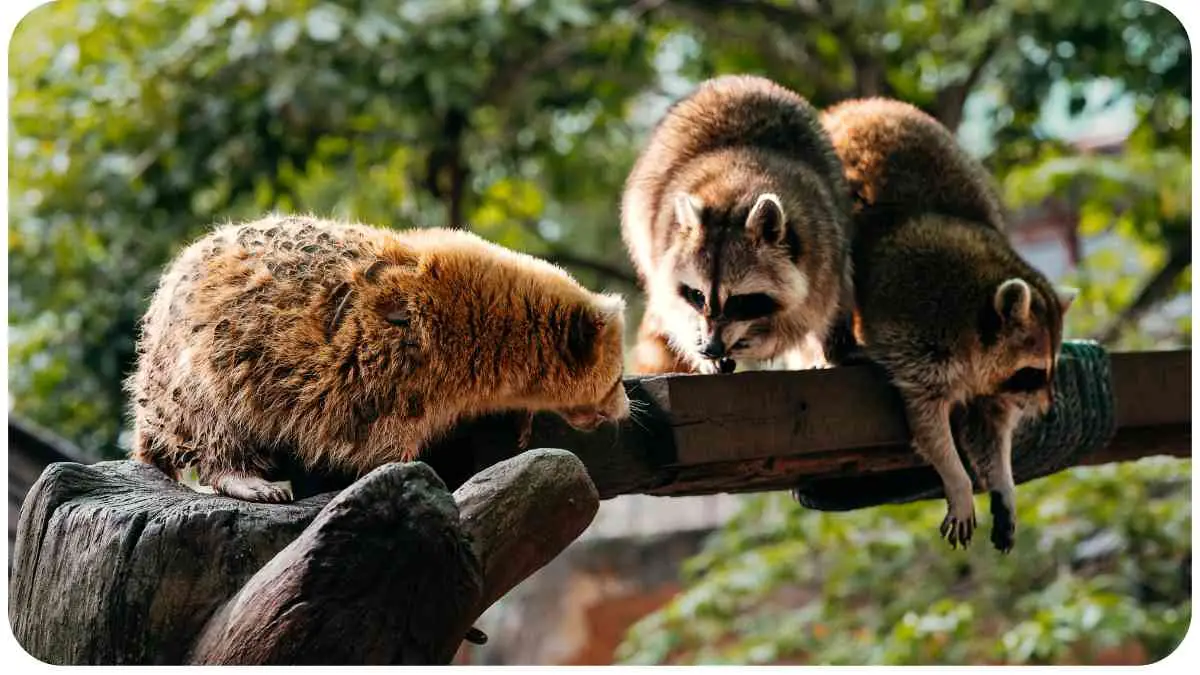Discovering the ideal diet for raccoons is crucial for their well-being. This article explores the common practice of feeding hot dogs to raccoons, shedding light on whether this beloved human snack is a suitable choice for our masked neighbors. As we delve into the nutritional aspects, legal implications, and alternatives, let’s redefine how we interact with these intelligent creatures.
| Takeaways |
|---|
| Feeding wild animals, including raccoons, can be dangerous for both the animals and humans involved. |
| Raccoons are omnivores with a varied diet that includes fruits, nuts, insects, small animals, and carrion. |
| Keeping raccoons as pets is not recommended as they are wild animals and can spread diseases and cause property damage. |
| If encountering a raccoon, it’s important to keep a safe distance and never attempt to touch or feed them. Contact a wildlife control professional for assistance if needed. |
Exploring Raccoon Nutrition
When considering the nutritional needs of raccoons, the temptation to offer hot dogs as a snack may arise. However, it’s crucial to understand that while hot dogs might seem convenient, they fall short in providing essential nutrients. Opting for real meat, though not an ideal choice, still proves better than resorting to empty-calorie snacks like hot dogs.
If processed food is a necessity, consider alternatives such as cheese or yogurt. These options not only offer calcium but also contain live cultures, promoting a healthy intestinal environment for your raccoon friend. Prioritize their well-being with thoughtful and nutritious choices.
Are Hot Dogs Harmful to Wild Raccoons?

Contrary to being inherently “bad” for raccoons, hot dogs are indeed an unhealthy dietary choice for these intelligent creatures. Raccoons have distinct nutritional requirements that differ from those of humans, making it challenging for them to digest the contents of hot dogs properly.
Additionally, the potential health risks extend beyond mere nutritional inadequacy. Hot dogs can carry diseases that pose a threat to raccoons. For a treat that aligns with their needs, opting for fruits or vegetables proves to be a safer and more nutritionally suitable alternative, promoting the well-being of wild raccoons.
“Feeding raccoons can be a fun and enjoyable experience, but it’s important to make sure you’re giving them foods that are good for their health. In my experience, hot dogs are not a healthy food for raccoons, so it’s best to avoid giving them as treats.”
Why Hot Dog Meat is Unhealthy for Raccoons
Feeding raccoons hot dogs is strongly discouraged for various reasons. Despite the human palate finding them tasty, it’s crucial to recognize that palatability doesn’t equate to suitability for animals. Hot dog meat lacks any significant nutritional value and has even been associated with heart disease in humans.
Providing a raccoon with a hot dog can lead to sickness, primarily due to the excessive fat content consumed in a single sitting. Raccoons require a balanced diet rich in protein and carbohydrates for a healthy life. Hot dogs, unfortunately, don’t meet these essential dietary needs, potentially causing nutritional deficiencies.
It’s also worth noting the caution regarding certain brands of canned cat food. While suitable for felines, the inclusion of organ meats may pose harm to raccoons over prolonged periods. Elevated cholesterol levels and high saturated fat content in such foods could adversely affect the health of raccoons. Prioritize their well-being by opting for nutritionally sound alternatives in their diet.
Can Raccoons Consume Hot Dogs?
Yes, raccoons can indeed eat hot dogs, but it’s essential to acknowledge that it’s not the healthiest choice for them. Hot dogs, with their high sodium and fat content, offer little nutritional value to these wild creatures. While they might provide some protein, they lack the natural taste appeal that other meats, such as mice or squirrels, hold for raccoons.
Considering the raccoon’s natural diet, offering processed meats like hot dogs might not align with their preferences. To encourage them to linger until dark, consider opting for a healthier alternative like fruits. This ensures not only a more nutritious treat but also aligns with the raccoons’ natural dietary inclinations.
“If you’re looking for a healthy and delicious snack to give to raccoons, consider offering them bananas! Not only do they love the taste, but bananas are also a safe and nutritious food for these animals. Check out our article on bananas as a food for raccoons to learn more.”
Bonding with Raccoons and Considering Health

Feeding a raccoon a hot dog can indeed be a bonding experience, as these smart and social animals enjoy spending time with their human companions. However, it’s crucial to reconsider the perceived benefits:
- Bonding Opportunity: Offering a hot dog provides a chance to bond with your furry friend. Raccoons, known for their intelligence, appreciate interaction with humans.
- Health Considerations: While hot dogs do contain protein, it’s essential to be mindful of their overall nutritional value. Hot dogs are high in sodium and fat, and excessive protein intake can lead to kidney failure in raccoons. Moderation is key to preventing health issues.
- Caution on Protein Intake: Contrary to being a straightforward source of nutrition, excessive protein from hot dogs can potentially harm a raccoon’s kidneys. It’s important to monitor and regulate their diet to maintain overall health.
- Alternative Nutrition Sources: Exploring alternative, healthier food options ensures a more balanced diet for raccoons. While they might enjoy the taste of hot dogs, incorporating a variety of nutritious foods aligns better with their dietary needs.
Hot Dogs and Health Considerations
Raccoons, as omnivores, possess a diet that includes plants, insects, and small animals. They are adaptable scavengers, occasionally consuming meat from deceased animals when live prey is unavailable.
Concerns with Hot Dogs: While raccoons are versatile eaters, hot dogs pose health risks due to their high fat and sodium content. Regular consumption of hot dogs can lead to adverse health effects, potentially resulting in sickness or even death. It’s crucial to recognize that a diet rich in unhealthy foods like hot dogs can compromise the overall well-being of raccoons.
Promoting Healthier Options: Opting for a diverse and balanced diet more closely aligned with a raccoon’s natural intake is essential. Providing foods that mirror their omnivorous tendencies, such as fruits, vegetables, and lean meats, contributes to their health and helps prevent the negative consequences associated with a diet high in processed and unhealthy items.
“While it might be tempting to offer onions to raccoons as a treat, it’s important to know that this food can actually be harmful to their health. In fact, onions contain compounds that can cause anemia in these animals. For more information on foods to avoid feeding raccoons, check out our article on onions and raccoons.”
Legal Considerations for Hot Dogs
In many locations, feeding raccoons hot dogs is generally permitted, but it’s essential to be aware of potential legal restrictions. While the act of feeding wildlife might be lawful in certain areas, there are instances where it is explicitly prohibited.
Example of Legal Restrictions: In New York City, feeding any wildlife, including raccoons, is illegal. The rationale behind such regulations often stems from concerns about diseases that could be transmitted from wildlife to humans.
Verify Local Regulations: To ensure compliance with local laws, it’s crucial to ascertain whether feeding raccoons is permitted in your specific area. Contacting local authorities is a prudent step before initiating any feeding practices. This precautionary measure not only safeguards against potential legal issues but also aligns with responsible wildlife interaction.
In conclusion, while feeding raccoons hot dogs may be allowed in many places, understanding and adhering to local regulations is imperative. Verify the legality of such activities to promote a harmonious coexistence with wildlife while respecting legal boundaries.
Hot Dogs and Raccoon Palates
Raccoons, remarkably similar to humans, share a penchant for enjoying familiar foods. The allure of hot dogs is undeniable, making them a popular treat for both raccoons and humans. The shared appreciation for this delicious snack fosters a unique connection between these clever creatures and their human companions.
Feeding Considerations: To ensure a safe and enjoyable experience for your raccoon friend, a few considerations come into play:
- Choose the Right Hot Dog: Opt for hot dogs that align with a raccoon’s dietary needs. Selecting a suitable and healthy option prevents the risk of them falling ill due to an unhealthy snack.
- Moderation is Key: While the temptation to indulge your raccoon companion may be strong, it’s crucial to exercise moderation. Avoid providing too much food at once, encouraging a slow and measured nibbling approach. This precautionary measure minimizes the risk of choking, ensuring a safe and enjoyable dining experience for your raccoon friend.
“If you’re looking for a healthy snack to offer to raccoons, peanuts can be a great choice! Not only are they packed with protein and healthy fats, but raccoons also love the taste. Check out our article on peanuts as a food for raccoons to learn more about this nutritious treat.”
Feeding Wild Raccoons

If raccoons frequent your yard, deterring them may be a top concern. Known for raiding garbage and compost bins in pursuit of sustenance, raccoons can pose a challenge to homeowners. But what if there’s a way to redirect their attention from household scraps to a more enticing alternative: hot dogs?
In this article, we delve into the safety and legality of feeding wild raccoons hot dogs. We explore the potential health implications associated with consuming hot dogs and underscore why such practices should be approached with caution, if not altogether avoided.
“Raccoon dogs are a unique and fascinating species, but many people wonder whether they can be kept as pets. The answer, unfortunately, is no. These animals are not domesticated and are not suitable for life in a human household. To learn more about raccoon dogs and their natural habitat, check out our article on the domestication of raccoon dogs.”
Conclusion
In conclusion, hot dogs fall short of being the ideal food for raccoons and should never be considered a substitute for their natural meat sources. While the temptation to offer these snacks may arise, it’s crucial to prioritize the raccoon’s health and nutritional needs.
For those keen on providing sustenance to wild raccoons in their backyard or at different stages of their life cycle, exploring alternative food options proves essential. The key lies in understanding the raccoon’s preferences and tailoring offerings accordingly.
Rather than relying on processed and potentially unhealthy choices, opting for a diverse and natural diet ensures a positive impact on the well-being of these resourceful creatures.
Further Reading
The Spruce Pets: What Do Raccoons Eat?: This article provides detailed information on the dietary needs of raccoons, including what types of foods they eat in the wild and how to offer them a balanced diet in captivity.
Havahart: The Dangers of Feeding Raccoons and Skunks: Feeding wild animals may seem harmless, but it can actually be dangerous for both the animals and humans involved. This article explores the risks associated with feeding raccoons and skunks and provides advice on how to discourage them from visiting your property.
Newsweek: This Man Feeds Raccoons on His Porch Every Night, Twitter Has Some Thoughts: This news article features a story of a man who regularly feeds raccoons on his porch and the reactions it sparked on social media. It provides an interesting perspective on the debate around feeding wild animals.
FAQs
What are the risks of feeding raccoons and skunks?
Feeding raccoons and skunks can lead to the animals becoming dependent on humans for food, which can be harmful to both the animals and humans. It can also lead to an increase in nuisance wildlife activity, as well as the spread of diseases.
What is the natural diet of raccoons?
Raccoons are omnivores and have a varied diet that includes fruits, nuts, insects, small animals, and carrion. They are opportunistic feeders and will eat whatever food is available to them.
Can raccoons be kept as pets?
No, raccoons are wild animals and are not suitable as pets. In many areas, it is illegal to keep raccoons as pets due to their potential to spread diseases and cause property damage.
Are bananas a safe food for raccoons to eat?
Yes, bananas are a safe and nutritious food for raccoons to eat. They are a good source of potassium and fiber, and raccoons enjoy the sweet taste.
What should I do if I encounter a raccoon on my property?
It’s important to keep a safe distance from raccoons and never attempt to touch or feed them. If a raccoon is causing damage or behaving aggressively, contact a wildlife control professional for assistance.

I am Hellen James, a landscape architect. For many years I have written about landscaping for various publications; however, recently decided to focus my writing on personal experience as a profession.

